Greece boat disaster: Two families united in grief thousands of miles apart
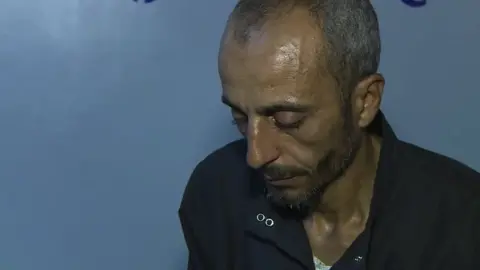 BBC
BBCA father is hunched over with grief, his wiry frame almost cut in two.
"My son was only 16 years old," says Reda al-Sayed, staring at a smiling photo of him on a phone.
"Mohamed would see pictures of other youths who managed to travel to Italy and started saying he would take the journey too. The cost of living here is very high and he wanted a better future."
Every house in Abrash - a farming village north of the Egyptian capital - has a similar story. They fear their young men are now at the bottom of the Mediterranean.
Dozens of them are believed to have travelled to Libya and boarded a fishing boat which sank 80km off the coast of Greece on 14 June.
The UN says between 400 and 750 people could have been crammed onto the vessel. Hundreds are feared dead.
Mr al-Sayyed says seven members of his family, including his son, are missing.
"He left without telling me and called me before he got on the boat," says Mr al-Sayyed, sitting on the bed in his one-room house.
"I urged him to return to Egypt, but he didn't come back. Now I'm searching for his name in the list of survivors."
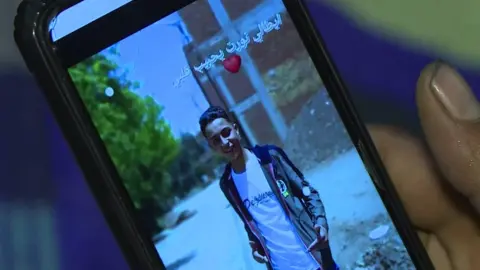
In the neighbouring village of Mashtoul al-Souq, wailing women crowd the narrow streets.
'We need to know if our sons are dead or alive," says one.
An estimated 300-350 Egyptians are said to have been on the sunken vessel, but no official figures have been given.
Egyptian authorities have released the names of 43 survivors from the country, but have otherwise said little.
They have set up a team to find out how many were on board and to verify their identities. But this will take time. The shipwreck lies in one of the deepest parts of the Mediterranean.
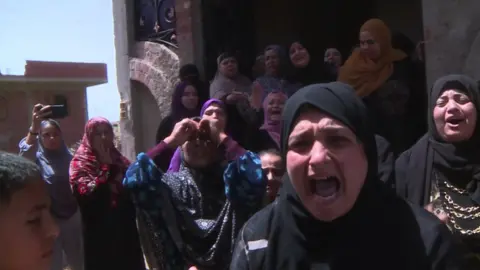
In the meantime, many of the families are facing massive debts after borrowing heavily to pay for the journey.
"My son was picked up near the border with Libya by one of the traffickers, who then demanded that I pay him around 140,000 Egyptian pounds ($4,300) or he'd kill my son," says Mr al-Sayyed.
According to United Nations High Commissioner for Refugees (UNHCR) figures, 6,232 Egyptians have crossed by sea to Italy so far in 2023, the second largest group making the dangerous voyage.
The official Egyptian unemployment rate stands at just over 7% but a devaluing currency and rocketing food prices mean life is very difficult.
Dreams of a better life
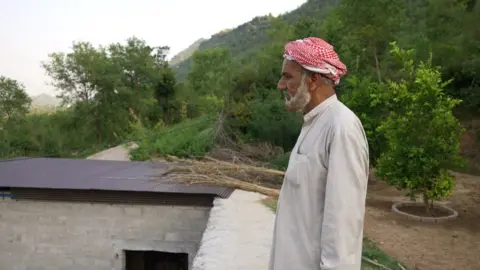
Thousands of miles away, in Pakistan-administered Kashmir, another family is shrouded in grief.
Raja Anwar stands on the roof of his house in Kotli district in the village of Bundli, overlooking lush green forests, staring helplessly at the gate.
He longs to see his son Abdul Jabbar walk through it. The 38-year-old had messaged Mr Anwar to tell him he was getting on the boat in Libya.
"We had to take a huge loan of 22 lakhs ($8,000) from our extended family to pay for his journey," says Mr Anwar.
He says they have lost a young generation of men - his son and four nephews. His youngest nephew, Owais Tariq, was only 19 years old. All but one were married with young children.
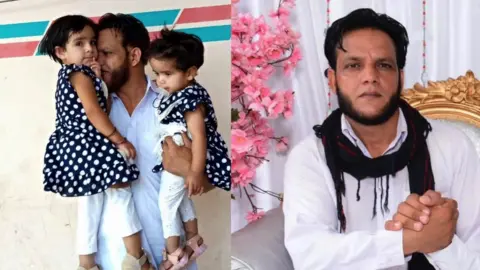 Raja Anwar
Raja AnwarMr Jabbar had worked in the Middle East as a labourer, earning around $120 a month. He came home, saying the conditions were tough, and started working as a baker at a local hotel.
But he wanted to earn enough money to buy a house and a car for his wife and two daughters. He thought making it to Europe was his only way.
For the first few days, Mr Jabbar and his four cousins were in constant contact with the family, as the group travelled from Islamabad to Dubai, then on to Egypt and Libya.
After they arrived at the location in Libya specified by their agent, they were taken to a small room packed with other travellers to wait until the boat arrived, says Mr Anwar.
His son had sent him a video from the room which made his heart sink.
"They lay on top of each other like sheep in that tiny room and had not been given anything to eat for days. It broke my heart."
Like in Egypt, hundreds of Pakistanis are said to have been on the fishing trawler heading for Italy. There were 28 people from the village of Bundli alone, with only two survivors confirmed so far.
The Greek authorities say there were 12 Pakistani survivors among the 104 people who were rescued.
Pakistan's Prime Minister Shehbaz Sharif has announced a high-level probe into human trafficking to "identify loopholes" in the system.
Meanwhile, the media have blamed the country's political and economic crisis for unemployment and poverty, which pushes people to risk everything.
Inflation has risen to a record 40% this year, the highest rate in South Asia, according to Pakistan's statistics bureau.
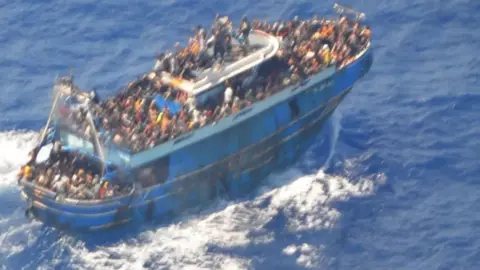 Hellenic Coast Guard
Hellenic Coast GuardNine Egyptian men accused of causing the disaster have pleaded not guilty in a Greek court to people-smuggling and other offences.
But Greek authorities are also under pressure over their role in the catastrophe. The BBC obtained evidence casting doubt on the account of events put forward by the coastguard - which claimed the boat was on a course to Italy and not in need of assistance in the hours before it sank.
Greek officials maintain those on board said they did not want help and were not in danger until just before their boat sank. But the UN has called for an investigation into Greece's handling of the disaster, amid claims more action should have been taken earlier to initiate a full-scale rescue attempt.
